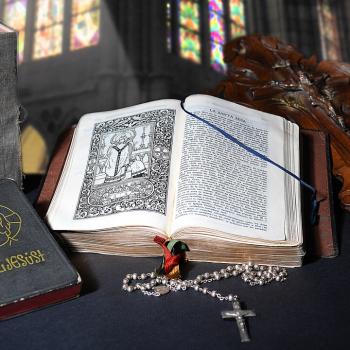
In a category of discovery that might be called “found blogs,” I ran across this gem on a site called Reformation 21, courtesy of the ever-helpful assistance of the polemical rogue John Bugay. The title of the article, by Leonardo De Chirico, is “Vatican Files No. 19”; and based on both its contents and the allusion (as I presume) to that bizarre TV show from the 1990s, I am rather afraid that to peer into Vatican Files 1-18 might take me deeper into the realm of science fiction than I want to go.
Mr. Bugay recommends the article in this blog post as a “blunt and honest” masterpiece of exposure. What Mr. De Chirico exposes, according to Mr. Bugay, is the “Roman Catholic shell game” with the meaning of words. The word that both these fine upstanding gentlemen are thinking of is “evangelization.” According to Mr. Bugay, the purpose of said “shell game” is to—what else?—“expand the boundaries of the Roman church.” In Mr. Bugay’s jaded way of seeing reality, Catholicism is not about winning souls for Christ; no, instead it’s about getting fat. Mr. Bugay blames John Paul II for all this madness and trots out the typical anti-Catholic bogeymen.
[S]ome bold Roman Catholics (like the CTC gang) … are “e—” in their efforts, [but] most Roman Catholics just won’t “get it.” Rome simply doesn’t preach “the Gospel,” it preaches “sacraments, Mariology, hierarchy, traditions, papacy, devotions.”
Amazingly, he leaves out Rosaries, vain repetitions, indulgences, Mass cards, saints, liturgies, vestments, trinkets, baubles, and beads. But let that go long enough to take up Mr. De Chirico’s brave exposure of the Catholic abduction of the E-word. (I dare not write the whole thing, lest fire rain down on me.) For the basic gist of Installment No. 19 in the Vatican Files is to wonder how those Catholics, wicked as they are, dare to use such a fine, upstanding, Protestant word! Mr. De Chirico explains his curious sense of exclusivity and entitlement.
There was a time [Note the standard fairy tale beginning here.] in which the [E word] meant something like this: Biblically, it was defined around the evangel (i.e., the Gospel) as it is truly witnessed in Scripture.
[And Mr. De Chirico is, of course, the very man to tell us what the “true witness” of Scripture is.]
Historically it referred to the sixteenth century Protestant Reformation [Hmmm. No known usage of the word before Luther and Calvin?] and the E— Revivals of subsequent centuries. Doctrinally, it has pointed to Christian orthodoxy. …
Well, we can stop here. You see the point. “Orthodoxy,” in Mr. De Chirico’s anachronistic, fairy tale view of Christian history, roughly means “stuff no one dreamed up until Martin Luther.”
But now—and while Mr. Bugay lays the blame for this at the feet of John Paul II, Mr. De Chirico lays it at the feet of George Weigel—the Catholics have come along in an attempt to steal the E word from Protestants. How dare they. Don’t they know that we have our corner of the dictionary and they have theirs? The papists need to stay in their own ghetto, damn it.
The recent book by George Weigel is a clever attempt to re-engineer the word by overlooking its Biblical roots, by severing its historical roots and replacing them with other roots, by changing its doctrinal outlook … and by renegotiating its religious use. … [E— Catholicism embraces not the Gospel but] sacraments, Mariology, hierarchy, traditions, papacy, devotions, etc.
Heavens, when will these horrors end? Those cultic papist Romanists have not only added books to the Bible, but now they’re adding new definitions to the dictionary. You see how they play it? First they add to the word of God, and next they add to words.
Mr. De Chirico attempts to explain what it all amounts to in the end. (And I beg you, gentle reader, if you can understand this, to please clarify it for me, because I am sure I don’t know, although I have tried hard to find out.)
We started with Socrates and we end with Virgil. … The story of the Trojan horse tells us how what seemed to be a victory turned out to be a devastating defeat. [E— Catholicism] may appear as an E—ly friendly project and we may want to welcome it. In actual fact, it is an intellectually courageous attempt to re-define what E— means, maintaining the same spelling but giving it a Roman Catholic meaning. It is a different word altogether.
I suspect he’s trying to draw an analogy between Mr. Weigel’s book and the Trojan Horse, but the point of it is lost to me in the midst of the strange insistence that Protestants have squatters rights to the E word.
This is what passes for thought on the other side of the Tiber River.
***
If you like the content on this blog, your generous gift to the author helps to keep it active. I remember all my supporters in my Mass intentions each week.












